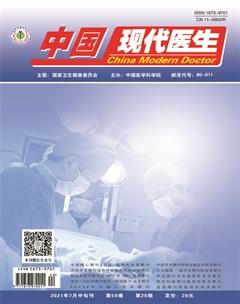阿帕替尼联合埃克替尼一线治疗EGFR敏感突变晚期非小细胞肺癌的效果及安全性
黄仲 李姝君 林燕明 彭晓霞 李晓玲
[關键词] 阿帕替尼;埃克替尼;非小细胞肺癌;EGFR突变
[中图分类号] R743.2 [文献标识码] B [文章编号] 1673-9701(2021)20-0104-05
Efficacy and safety of apatinib combined with icotinib as first-line treatment for advanced non-small cell lung cancer with EGFR sensitive mutation
HUANG Zhong1 LI Shujun1 LIN Yanming1 PENG Xiaoxia1 LI Xiaoling2
1.Lung Tumor Ward, Tumor Hospital, Affiliated Hospital of Guangdong Medical University, Zhanjiang 524001, China;2.Pathological Diagnosis and Research Center, Affiliated Hospital of Guangdong Medical University, Zhanjiang 524001, China
[Abstract] Objective To investigate the efficacy and safety of apatinib combined with icotinib as first-line treatment for advanced non-small cell lung cancer(NSCLC) with epidermal growth factor receptor(EGFR) sensitive mutation. Methods A total of 45 patients with advanced NSCLC with EGFR sensitive mutation admitted to and treated in the Affiliated Hospital of Guangdong Medical University from October 2017 to April 2019 were screened. They were randomly divided into the observation group(n=22) and the control group(n=23). The observation group was treated with apatinib combined with icotinib, while the control group was treated with icotinib. The objective remission rate, disease control rate, progression free survival time and adverse reactions(ARs) of the two groups of patients were analyzed. Results The objective remission rates between the observation group and the control group were 77.27% and 65.22% respectively, and the disease control rates were 95.45% and 91.30% respectively, all without statistically significant differences between the two groups(P>0.05). The median progression free survival time of the observation group was 13.7 months, that was longer than that of 9.6 months in the control group, with statistically significant difference(P<0.05). The incidences of grade 1-4 hypertension and proteinuria in the observation group were all higher than those in the control group, with statistically significant differences(P<0.05). There were no statistically significant differences in all the incidences of grade 1-4 gastrointestinal reactions, rash, hepatic function damage, fatigue, hand-foot syndrome and serious ARs(grade 3-4) between the two groups(P>0.05). Conclusion Apatinib combined with icotinib as first-line treatment for advanced NSCLC with EGFR sensitive mutation can prolong the progression free survival time of patients with acceptable safety, but it needs to be further confirmed by large-scale multicenter clinical trials.

